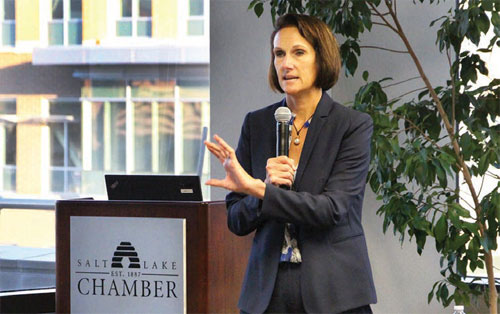By Brice Wallace
Whatever may happen to improve the American healthcare system, it will have to occur in a “we win, you lose” national political atmosphere, according to a U.S. Chamber of Commerce official.
Speaking in Salt Lake City recently during the Salt Lake Chamber’s Business & Health Care Summit, Katie Mahoney, vice president of health policy for the U.S. chamber, said the federal government is “a very polarized environment” and reminded the audience of “the unfortunate political landscape in terms of the very polarized Congress that we’re working with right now.”{mprestriction ids="1,3"}
“That is, I think, unfortunate not only for us as a country but also as we look for opportunities to fix the current healthcare system,” Mahoney said. “It’s sort of, who’s going to get the win, if you will, if something happens, and who is going to therefore lose because the other party won?”
Exacerbating the situation in D.C. is that both political parties “have lots of things that are kind of hanging around their necks,” she said. For the GOP in the wake of its ongoing issues with the Affordable Care Act, it’s the party’s positioning on the issue of coverage for people with pre-existing conditions. For the Democrats, it’s the intraparty struggle with “Medicare for All.”
“Not intentionally, I think, and very unfortunately, because of their efforts on [Obamacare] ‘repeal and-replace’ in 2017 and because of the [subsequent] litigation … they’re really getting branded as the party that does not protect people with pre-existing conditions,” Mahoney said of the Republicans.
“They’re really struggling with that. I think, in reality, they do believe in that, but because of their efforts to repeal and replace the ACA and because of their efforts on the litigation, there is somewhat an understandable reason that the Democrats are pounding their chests and say Republicans don’t, in fact, support this. And it’s gotten a little bit of a whipsaw dynamic going on within the Republican party.”
Going forward, Mahoney said, Republicans are still struggling with whether or not they should continue to “bang the drum on repeal and replace — ‘The Affordable Care Act is terrible, Obamacare is the worst thing ever’ — versus moving to, in my opinion, a much more pragmatic approach, where the country as a whole wants to see that the Congress go in terms of fixing and modifying those provisions that need to be improved upon.”
Meanwhile, despite some “outliers” that fully support “Medicare for All,” the Democratic caucus appears to recognize that it is “a step too far,” she said.
“I think what we’re going to see in the upcoming election is more of a comfort level with the Medicare buy-in option as an additional choice. ‘What’s so bad about lowering the level from 65 to 55? Is that really that significant of a reform? Is that going to utterly disrupt the entire healthcare system?’ So, I think the Democrats are really struggling with how to deal with that struggle as far as the ‘Medicare for All’ single-payer extreme.”
Democrats also must address the ACA, she added. “Do they see some of the failings of the ACA and do they blame it on the Republicans and say, ‘If we’d only gone a step back in 2010, we would have been in a better situation now’? Or are they similarly looking at a more pragmatic approach in terms of fixing it?” she asked.
In addition to the legislative side, Mahoney’s briefing included updates on changes happening regarding healthcare regulation and litigation.
The major healthcare questions for the nation continue to focus on the role of the federal government and how access to healthcare can be improved, she said.
“I think with the Affordable Care Act, there was a perception and a belief that if you can expand coverage, people can get increased access, and while I think that’s true in some instances, it doesn’t necessarily guarantee access,” she said. “And so now we’re struggling as a country with, yes, more people have coverage, there are fewer people uninsured, but cost is now becoming a barrier, so what do we do with affordability to improve access?”{/mprestriction}








